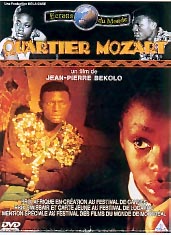Fiche Personne
Cinéma/TV
Danse
Histoire/société
 © DR
© DR
Jean-Pierre Bekolo
Réalisateur/trice, Ecrivain/ne, Producteur/trice, Professeur, Scénariste
(Homme)
Cameroun
 © DR
© DR
Site web : http://www.jeanpierrebekolo.com
Français
Cinéaste, enseignant et essayiste camerounais.
Sometimes credited as | PArfois crédité sous le nom de
Jean-Pierre BEKOLO OBAMA
Jean-Pierre BEKOLO est un réalisateur, scénariste, producteur, essayiste et professeur.
Il est connu pour « Les Choses et Les Mots de Mudimbe – Mudimbe’s Order of Things » (2015), « Le Président » (2013), « Les Saignantes – The Bloodettes » (2005), « Aristotle’s Plot – Le Complot d’Aristote » (1995), « Quartier Mozart » (1992)
Né au Cameroun en 1966, Jean-Pierre Bekolo Obama est cinéaste et enseigne le cinéma aux États-Unis. Il est révélé à Cannes 1992 avec son film « Quartier Mozart » qu’il réalise à tout juste 25 ans. Ce film a obtenu de nombreux prix à Locarno, Montréal, Ouagadougou et une nomination aux British Awards aux côtés de « Reservoir Dogs » de Tarantino. Pour les 100 ans du cinéma, il réalise « Le Complot d’Aristote », un film appartenant à une série commandée par le British Film Institute à laquelle ont participé Martin Scorsese, Stephen Frears, Bernardo Bertolucci et Jean-Luc Godard. Il a été professeur à l’University of North Carolina à Chapel Hill, à la Virginia Polytechnic Institute et à Duke University. Il a notamment développé une méthode d’enseignement, Auteur Learning, qu’il expérimente dans les Universités noires des Etats-Unis. Son dernier long métrage, « Les Saignantes », a obtenu l’Etalon d’Argent et le prix Meilleures Actrices au Fespaco 2007. Il a réalisé la même année une installation vidéo, « Une Africaine dans l’Espace », au Musée du Quai Branly à Paris.
Il a réalisé une série télévisée au Mozambique et en Afrique du Sud destinée à toutes les chaînes de télévision du continent sur cette jeunesse Imagin Africa. Enfin il a été invité à participer à la classe inaugurale de leaders au sein de la nouvelle école de Bill Clinton ; la Clinton School of Public Service. Il est l’auteur du livre Africa For The Future, le cinéma pourrait-il permettre d’accoucher d’un nouveau monde ? (2009).
FILMOGRAPHY | FILMOGRAPHIE (selection) :
2015 : Les choses et les mots de Mudimbe (doc. 243 mins)
2013 : Le Président (mocumentaire, 63 mins)
2007 : Les Saignantes
2006 : Avez-vous vu Franklin Roosevelt ? (en cours)
2005 : Les Saignantes (Etalon d’Argent, Fespaco 2007).
1996 : La Grammaire de ma grand-mère (TV – 8 mn)
Le Complot d’Aristote
1992 : Quartier Mozart
Fuente / Fontes / Our Source / Quelle / Nos Sources (MAIS INFORMAÇÕES / READ MORE / PLUS D’INFOS) :
– Africiné Magazine (Dakar)
– https://jeanpierrebekolo.com/
– www.instagram.com/jeanpierrebekolo/
– www.facebook.com/events/1762075154043791/
– https://harvardfilmarchive.org/programs/jean-pierre-bekolo-2024-mcmillan-stewart-fellow
Updated by Thierno DIA, 02 May 2025
Sometimes credited as | PArfois crédité sous le nom de
Jean-Pierre BEKOLO OBAMA
Jean-Pierre BEKOLO est un réalisateur, scénariste, producteur, essayiste et professeur.
Il est connu pour « Les Choses et Les Mots de Mudimbe – Mudimbe’s Order of Things » (2015), « Le Président » (2013), « Les Saignantes – The Bloodettes » (2005), « Aristotle’s Plot – Le Complot d’Aristote » (1995), « Quartier Mozart » (1992)
Né au Cameroun en 1966, Jean-Pierre Bekolo Obama est cinéaste et enseigne le cinéma aux États-Unis. Il est révélé à Cannes 1992 avec son film « Quartier Mozart » qu’il réalise à tout juste 25 ans. Ce film a obtenu de nombreux prix à Locarno, Montréal, Ouagadougou et une nomination aux British Awards aux côtés de « Reservoir Dogs » de Tarantino. Pour les 100 ans du cinéma, il réalise « Le Complot d’Aristote », un film appartenant à une série commandée par le British Film Institute à laquelle ont participé Martin Scorsese, Stephen Frears, Bernardo Bertolucci et Jean-Luc Godard. Il a été professeur à l’University of North Carolina à Chapel Hill, à la Virginia Polytechnic Institute et à Duke University. Il a notamment développé une méthode d’enseignement, Auteur Learning, qu’il expérimente dans les Universités noires des Etats-Unis. Son dernier long métrage, « Les Saignantes », a obtenu l’Etalon d’Argent et le prix Meilleures Actrices au Fespaco 2007. Il a réalisé la même année une installation vidéo, « Une Africaine dans l’Espace », au Musée du Quai Branly à Paris.
Il a réalisé une série télévisée au Mozambique et en Afrique du Sud destinée à toutes les chaînes de télévision du continent sur cette jeunesse Imagin Africa. Enfin il a été invité à participer à la classe inaugurale de leaders au sein de la nouvelle école de Bill Clinton ; la Clinton School of Public Service. Il est l’auteur du livre Africa For The Future, le cinéma pourrait-il permettre d’accoucher d’un nouveau monde ? (2009).
FILMOGRAPHY | FILMOGRAPHIE (selection) :
2015 : Les choses et les mots de Mudimbe (doc. 243 mins)
2013 : Le Président (mocumentaire, 63 mins)
2007 : Les Saignantes
2006 : Avez-vous vu Franklin Roosevelt ? (en cours)
2005 : Les Saignantes (Etalon d’Argent, Fespaco 2007).
1996 : La Grammaire de ma grand-mère (TV – 8 mn)
Le Complot d’Aristote
1992 : Quartier Mozart
Fuente / Fontes / Our Source / Quelle / Nos Sources (MAIS INFORMAÇÕES / READ MORE / PLUS D’INFOS) :
– Africiné Magazine (Dakar)
– https://jeanpierrebekolo.com/
– www.instagram.com/jeanpierrebekolo/
– www.facebook.com/events/1762075154043791/
– https://harvardfilmarchive.org/programs/jean-pierre-bekolo-2024-mcmillan-stewart-fellow
Updated by Thierno DIA, 02 May 2025
English
Cameroonian filmmaker and Writer.
Sometimes credited as | PArfois crédité sous le nom de
Jean-Pierre BEKOLO OBAMA
Jean-Pierre BEKOLO is a Film Director, Screenwriter, Producer, Essayist and Professor.
He is known for « Les Choses et Les Mots de Mudimbe – Mudimbe’s Order of Things » (2015), « Le Président » (2013), « Les Saignantes – The Bloodettes » (2005), « Aristotle’s Plot – Le Complot d’Aristote » (1995), « Quartier Mozart » (1992)
Internationally acclaimed film director, known for his bold, satirical, and genre-defying films. Bekolo’s work challenges conventional cinematic norms, reshaping African narratives through experimental storytelling that engages and provokes audiences around the world. Advocating for artistic freedom his cinema is not just « African, » or postcolonial, or experimental, or narrative. It is also a cinema that constantly searches for itself, for what it is and what it can accomplish.
Jean-Pierre Bekolo is an avant-garde filmmaker whose imaginative work overturns stereotypes of Africa and African cinema. His entertaining films operate on multiple layers, engaging viewers with thrilling stories, biting humour and dramatic aesthetics.
He was born June 8th, 1966 in Yaounde, he studied physics at University of Yaounde and Television production (editing) at Institute National de l’Audiovisuel – INA in Paris where he also studied semiotics under Christian Metz.
Jean-Pierre Bekolo is a noted African film director from Cameroon. He already garnered attention at the Cannes Film Festival with his debut film « Quartier Mozart » (1992) made at the age of 25, with a style that is playful, comic, and sardonic became the representative of a new generation that has been working against the restrictive expectations of African cinema, mixing genres and linking pop with politics. « Quartier Mozart » won number of awards (Locarno, Montreal… and was nominated for the Surtherland Trophy in London along with Tarantino’s Reservoir Dogs.)
An advocate of artistic freedom, Bekolo is committed to realising Africa’s philosophies and cultures. « Quartier Mozart » shows the hybridity, complexity and humour in urban Yaounde in a playful, hip-hop reinvention of a traditional tale about gender, power, magic and politics.
In 1995, he directed « Aristotle’s Plot », the African entry in the British Film Institute’s series of films commemorating the centenary of cinema that has included the participation of artists such as Scorsese, Bertolucci, Frears, Miller, Reitz, and Godard. Part action movie send-up, part parody of Aristotle’s rules, part satire on Africa’s preoccupation with itself, this first African film selected at Sundance shows Bekolo to be an « increasingly fearless trickster. »
« Aristotle’s Plot » parodies rules and definitions, action movies and ‘African’ cinema made for European audiences, while aesthetically reflecting on the nature of existence, its ambiguities and absence of rigid categories.
Bekolo’s work on the re-representation of Africa also includes insightful documentaries that seek to educate, such as « Grandmother’s Grammar » (1996) on groundbreaking Senegalese filmmaker Djibril Diop Mambety.
His avant-garde political thriller « Les Saignantes » (2005) premiered at the Toronto film festival, was nominated in two categories at the French Césars (2009); it is considered to be the first African sci-fi movie. « Les Saignantes » won the Silver Stallion & Best Actress Awards at Fespaco (Pan African Film Festival Ouagadougou, Burkina Faso) in 2007.
This dystopian, sci-fi comic thriller with stunning surreal visuals, presents extreme corruption, feminism, social decay and intergenerational conflict for review.
In 2013, banned in Cameroon in 2013, Jean-Pierre Bekolo’s controversial film « Le President » (2015 AMAA Awards Best screenplay and Jury Special Prize) Aiming to incite viewers to conceive an alternate reality, his fake documentary « The President » is a hilarious, biting satire on African leaders who cling to power.
« Les Choses et Les Mots de Mudimbe » (2015) on the renowned Congolese philosopher, multi-linguist and uber-polymath. This 4 hours documentary was part of the official selection of the 2015 Berlinale. « An unusual film, as fascinating as its object/subject, opulent, sensitive, clever, and radical. Another station of delightful postcolonial, cosmopolitan filmmaking ».
Jean-Pierre Bekolo won the 2015 Prince Claus Award. He is awarded for his creative resistance, irreverence and eclectic African reworking of dominant cinema conventions; for creating a unique body of innovative work that both entertains and transmits profound socio-political messages; for his highly original aesthetics; for challenging misrepresentations of African cultures; and for re-affirming the power of film.
He was in 2015 a fellow of the Artists Program at the German Academic Exchange Service (DAAD) in Berlin.
Bekolo’s extended visit to Harvard University (USA) as the 2024 McMillan-Stewart Fellow in Distinguished Filmmaking features nearly all of his theatrical releases.
Fuente / Fontes / Our Source / Quelle / Nos Sources (MAIS INFORMAÇÕES / READ MORE / PLUS D’INFOS) :
– Africiné Magazine (Dakar)
– https://jeanpierrebekolo.com/
– www.instagram.com/jeanpierrebekolo/
– www.facebook.com/events/1762075154043791/
– https://harvardfilmarchive.org/programs/jean-pierre-bekolo-2024-mcmillan-stewart-fellow
Updated by Thierno DIA, 02 May 2025
Sometimes credited as | PArfois crédité sous le nom de
Jean-Pierre BEKOLO OBAMA
Jean-Pierre BEKOLO is a Film Director, Screenwriter, Producer, Essayist and Professor.
He is known for « Les Choses et Les Mots de Mudimbe – Mudimbe’s Order of Things » (2015), « Le Président » (2013), « Les Saignantes – The Bloodettes » (2005), « Aristotle’s Plot – Le Complot d’Aristote » (1995), « Quartier Mozart » (1992)
Internationally acclaimed film director, known for his bold, satirical, and genre-defying films. Bekolo’s work challenges conventional cinematic norms, reshaping African narratives through experimental storytelling that engages and provokes audiences around the world. Advocating for artistic freedom his cinema is not just « African, » or postcolonial, or experimental, or narrative. It is also a cinema that constantly searches for itself, for what it is and what it can accomplish.
Jean-Pierre Bekolo is an avant-garde filmmaker whose imaginative work overturns stereotypes of Africa and African cinema. His entertaining films operate on multiple layers, engaging viewers with thrilling stories, biting humour and dramatic aesthetics.
He was born June 8th, 1966 in Yaounde, he studied physics at University of Yaounde and Television production (editing) at Institute National de l’Audiovisuel – INA in Paris where he also studied semiotics under Christian Metz.
Jean-Pierre Bekolo is a noted African film director from Cameroon. He already garnered attention at the Cannes Film Festival with his debut film « Quartier Mozart » (1992) made at the age of 25, with a style that is playful, comic, and sardonic became the representative of a new generation that has been working against the restrictive expectations of African cinema, mixing genres and linking pop with politics. « Quartier Mozart » won number of awards (Locarno, Montreal… and was nominated for the Surtherland Trophy in London along with Tarantino’s Reservoir Dogs.)
An advocate of artistic freedom, Bekolo is committed to realising Africa’s philosophies and cultures. « Quartier Mozart » shows the hybridity, complexity and humour in urban Yaounde in a playful, hip-hop reinvention of a traditional tale about gender, power, magic and politics.
In 1995, he directed « Aristotle’s Plot », the African entry in the British Film Institute’s series of films commemorating the centenary of cinema that has included the participation of artists such as Scorsese, Bertolucci, Frears, Miller, Reitz, and Godard. Part action movie send-up, part parody of Aristotle’s rules, part satire on Africa’s preoccupation with itself, this first African film selected at Sundance shows Bekolo to be an « increasingly fearless trickster. »
« Aristotle’s Plot » parodies rules and definitions, action movies and ‘African’ cinema made for European audiences, while aesthetically reflecting on the nature of existence, its ambiguities and absence of rigid categories.
Bekolo’s work on the re-representation of Africa also includes insightful documentaries that seek to educate, such as « Grandmother’s Grammar » (1996) on groundbreaking Senegalese filmmaker Djibril Diop Mambety.
His avant-garde political thriller « Les Saignantes » (2005) premiered at the Toronto film festival, was nominated in two categories at the French Césars (2009); it is considered to be the first African sci-fi movie. « Les Saignantes » won the Silver Stallion & Best Actress Awards at Fespaco (Pan African Film Festival Ouagadougou, Burkina Faso) in 2007.
This dystopian, sci-fi comic thriller with stunning surreal visuals, presents extreme corruption, feminism, social decay and intergenerational conflict for review.
In 2013, banned in Cameroon in 2013, Jean-Pierre Bekolo’s controversial film « Le President » (2015 AMAA Awards Best screenplay and Jury Special Prize) Aiming to incite viewers to conceive an alternate reality, his fake documentary « The President » is a hilarious, biting satire on African leaders who cling to power.
« Les Choses et Les Mots de Mudimbe » (2015) on the renowned Congolese philosopher, multi-linguist and uber-polymath. This 4 hours documentary was part of the official selection of the 2015 Berlinale. « An unusual film, as fascinating as its object/subject, opulent, sensitive, clever, and radical. Another station of delightful postcolonial, cosmopolitan filmmaking ».
Jean-Pierre Bekolo won the 2015 Prince Claus Award. He is awarded for his creative resistance, irreverence and eclectic African reworking of dominant cinema conventions; for creating a unique body of innovative work that both entertains and transmits profound socio-political messages; for his highly original aesthetics; for challenging misrepresentations of African cultures; and for re-affirming the power of film.
He was in 2015 a fellow of the Artists Program at the German Academic Exchange Service (DAAD) in Berlin.
Bekolo’s extended visit to Harvard University (USA) as the 2024 McMillan-Stewart Fellow in Distinguished Filmmaking features nearly all of his theatrical releases.
Fuente / Fontes / Our Source / Quelle / Nos Sources (MAIS INFORMAÇÕES / READ MORE / PLUS D’INFOS) :
– Africiné Magazine (Dakar)
– https://jeanpierrebekolo.com/
– www.instagram.com/jeanpierrebekolo/
– www.facebook.com/events/1762075154043791/
– https://harvardfilmarchive.org/programs/jean-pierre-bekolo-2024-mcmillan-stewart-fellow
Updated by Thierno DIA, 02 May 2025
Films(s)
-
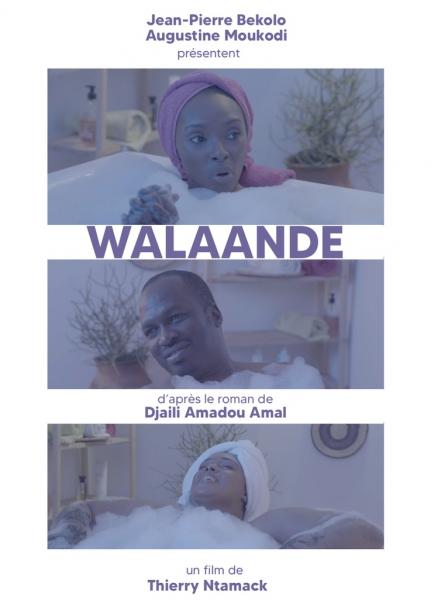 WalaandeLong-métrage – 2023Sakina travaille comme caissière dans une banque. Elle tombe amoureuse d'Alhadji Oumarou, la quarantaine, un grand commerçant de la ville, qui veut en faire son épouse. Sakina, qui avait jur&eacu…Jean-Pierre Bekolo est lié(e) à ce film en tant que producteur/trice
WalaandeLong-métrage – 2023Sakina travaille comme caissière dans une banque. Elle tombe amoureuse d'Alhadji Oumarou, la quarantaine, un grand commerçant de la ville, qui veut en faire son épouse. Sakina, qui avait jur&eacu…Jean-Pierre Bekolo est lié(e) à ce film en tant que producteur/trice -
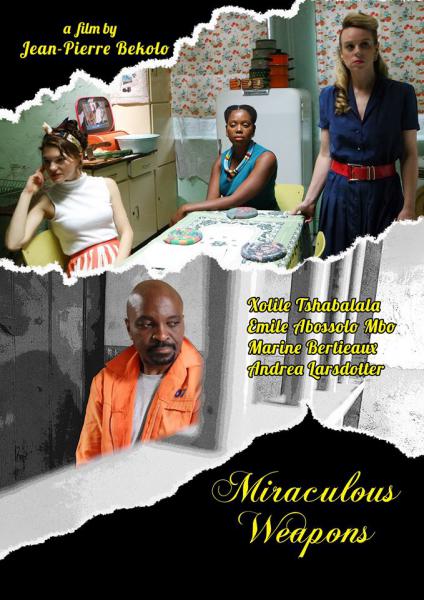 Armes Miraculeuses (Les) | Miraculous WeaponsLong-métrage – 2017En Afrique du Sud, dans les années 1960, trois femmes sont amoureuses d’un homme noir condamné à mort. Un film de Jean-Pierre Bekolo Cameroun / Afrique du Sud, 2017, Fiction, 1h44 mins, anglais, sous-titré français…Jean-Pierre Bekolo est lié(e) à ce film en tant que réalisateur/trice
Armes Miraculeuses (Les) | Miraculous WeaponsLong-métrage – 2017En Afrique du Sud, dans les années 1960, trois femmes sont amoureuses d’un homme noir condamné à mort. Un film de Jean-Pierre Bekolo Cameroun / Afrique du Sud, 2017, Fiction, 1h44 mins, anglais, sous-titré français…Jean-Pierre Bekolo est lié(e) à ce film en tant que réalisateur/trice -
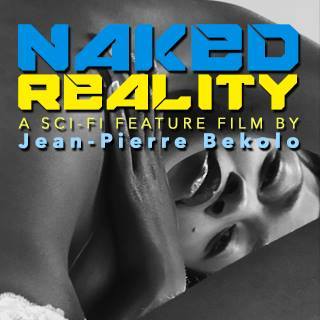 Naked RealityLong-métrage – 2016Wanita quitte sa maison un matin, sans savoir que sa première prière aux ancêtres la conduit à Dimsi, la terre qu’on ne peut pas voir. Elle était la première d’une nouvelle génération dont le métier va au-delà d’un trava…Jean-Pierre Bekolo est lié(e) à ce film en tant que réalisateur/trice
Naked RealityLong-métrage – 2016Wanita quitte sa maison un matin, sans savoir que sa première prière aux ancêtres la conduit à Dimsi, la terre qu’on ne peut pas voir. Elle était la première d’une nouvelle génération dont le métier va au-delà d’un trava…Jean-Pierre Bekolo est lié(e) à ce film en tant que réalisateur/trice -
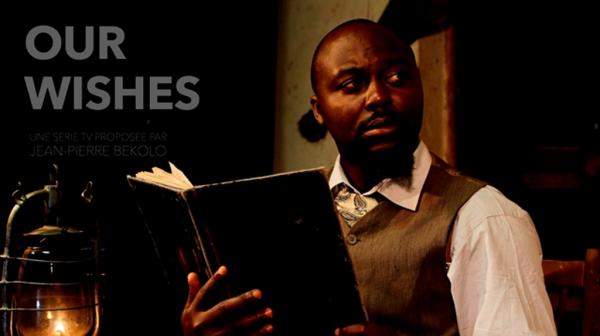 Our WishesCourt-métrage – 2016Dans le pays qu’on appelle encore Cameroons-River des chefs Douala et les commerçants allemands négocient à la veille de la conférence de Berlin qui va partager l’Afrique en 1884, le traité qui fera du Cameroun un territ…Jean-Pierre Bekolo est lié(e) à ce film en tant que réalisateur/trice
Our WishesCourt-métrage – 2016Dans le pays qu’on appelle encore Cameroons-River des chefs Douala et les commerçants allemands négocient à la veille de la conférence de Berlin qui va partager l’Afrique en 1884, le traité qui fera du Cameroun un territ…Jean-Pierre Bekolo est lié(e) à ce film en tant que réalisateur/trice -
 Mudimbe’s Order of Things – Part I (Les choses et les mots de Mudimbe – Partie 1)Long-métrage – 2015Directed by Jean-Pierre Bekolo. Cameroon, 2015, DCP, color, 116 min. French and English with English subtitles. DCP source: FilmmakerJean-Pierre Bekolo est lié(e) à ce film en tant que réalisateur/trice
Mudimbe’s Order of Things – Part I (Les choses et les mots de Mudimbe – Partie 1)Long-métrage – 2015Directed by Jean-Pierre Bekolo. Cameroon, 2015, DCP, color, 116 min. French and English with English subtitles. DCP source: FilmmakerJean-Pierre Bekolo est lié(e) à ce film en tant que réalisateur/trice -
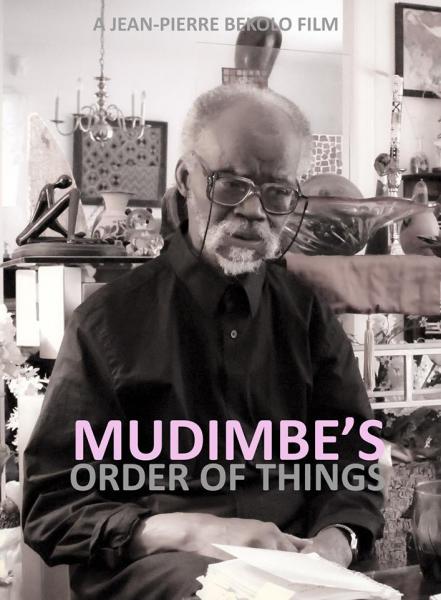 Choses et les mots de Mudimbe (Les)Long-métrage – 2014Un portrait du philosophe Valentin Mudimbe. Entretien biographique de Valentin Yves Mudimbe, né en 1941 dans ce qui est aujourd’hui la République Démocratique du Congo. Philosophe et philologue de formation, a contribué…Jean-Pierre Bekolo est lié(e) à ce film en tant que réalisateur/trice
Choses et les mots de Mudimbe (Les)Long-métrage – 2014Un portrait du philosophe Valentin Mudimbe. Entretien biographique de Valentin Yves Mudimbe, né en 1941 dans ce qui est aujourd’hui la République Démocratique du Congo. Philosophe et philologue de formation, a contribué…Jean-Pierre Bekolo est lié(e) à ce film en tant que réalisateur/trice -
 Président (Le) [dir. JP Bekolo]Long-métrage – 2013La disparition du Président du Cameroun quelques jours avant les élections est un signe politique fort. Jeunes, vieux, intellectuels, prisonniers, femmes, tout le monde s’agite. Pourquoi tous les chômeurs conduisent des…Jean-Pierre Bekolo est lié(e) à ce film en tant que réalisateur/trice
Président (Le) [dir. JP Bekolo]Long-métrage – 2013La disparition du Président du Cameroun quelques jours avant les élections est un signe politique fort. Jeunes, vieux, intellectuels, prisonniers, femmes, tout le monde s’agite. Pourquoi tous les chômeurs conduisent des…Jean-Pierre Bekolo est lié(e) à ce film en tant que réalisateur/trice -
 Pieds nickelés à l’Elysée (Les)– 2010Film sur les 50 ans d’indépendance des pays africains de Jean-Pierre Bekolo 2010 | 14ème Ecrans Noirs | YAOUNDE, Cameroun | www.ecransnoirs.com * Sélection (Séances Spéciales)Jean-Pierre Bekolo est lié(e) à ce film en tant que réalisateur/trice
Pieds nickelés à l’Elysée (Les)– 2010Film sur les 50 ans d’indépendance des pays africains de Jean-Pierre Bekolo 2010 | 14ème Ecrans Noirs | YAOUNDE, Cameroun | www.ecransnoirs.com * Sélection (Séances Spéciales)Jean-Pierre Bekolo est lié(e) à ce film en tant que réalisateur/trice -
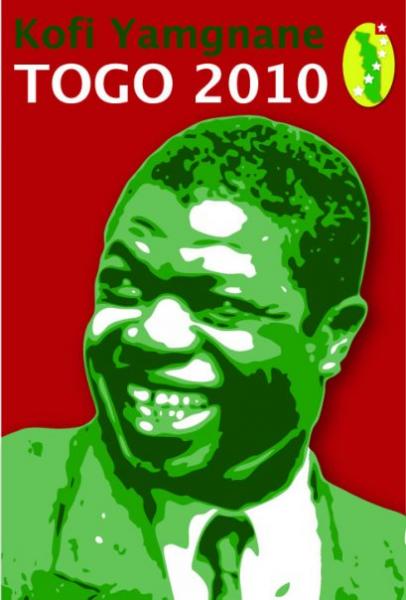 Et si l’Afrique lui ressemblait ?– 2010Pap Ndiaye, Ayoko Mensah, Mariam Kaba, Stephane Hessel, Pierre Joxe, Amina Kirsch, Ambroise Wally Nkama, Solange Ma’ossou, Patricia Morgagni, Jean-Pierre Bekolo, Aimé Sadou parlent de Kofi Yamgnane et du sens de sa candi…Jean-Pierre Bekolo est lié(e) à ce film en tant que réalisateur/trice
Et si l’Afrique lui ressemblait ?– 2010Pap Ndiaye, Ayoko Mensah, Mariam Kaba, Stephane Hessel, Pierre Joxe, Amina Kirsch, Ambroise Wally Nkama, Solange Ma’ossou, Patricia Morgagni, Jean-Pierre Bekolo, Aimé Sadou parlent de Kofi Yamgnane et du sens de sa candi…Jean-Pierre Bekolo est lié(e) à ce film en tant que réalisateur/trice -
 Origines de la Françafrique (Les)– 2010film de Jean-Pierre Bekolo ObamaJean-Pierre Bekolo est lié(e) à ce film en tant que réalisateur/trice
Origines de la Françafrique (Les)– 2010film de Jean-Pierre Bekolo ObamaJean-Pierre Bekolo est lié(e) à ce film en tant que réalisateur/trice -
 Avez-vous vu Franklin Roosevelt ? (Have you seen Franklin Roosevelt?)– 2008Jean-Pierre Bekolo est lié(e) à ce film en tant que réalisateur/trice
Avez-vous vu Franklin Roosevelt ? (Have you seen Franklin Roosevelt?)– 2008Jean-Pierre Bekolo est lié(e) à ce film en tant que réalisateur/trice -
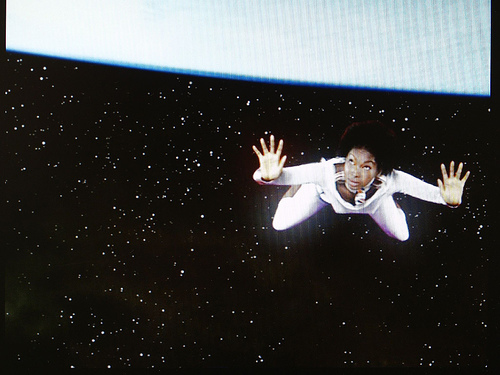 Une Africaine dans l’espace– 2007Une Africaine dans l’espace nous permet d’explorer les démarches d’une diaspora africaine contemporaine prospère en Amérique, dernière frontière terrestre du rêve. La diaspora africaine projette de reculer cette frontiè…Jean-Pierre Bekolo est lié(e) à ce film en tant que réalisateur/trice
Une Africaine dans l’espace– 2007Une Africaine dans l’espace nous permet d’explorer les démarches d’une diaspora africaine contemporaine prospère en Amérique, dernière frontière terrestre du rêve. La diaspora africaine projette de reculer cette frontiè…Jean-Pierre Bekolo est lié(e) à ce film en tant que réalisateur/trice -
 Comment ça va Ciné AfricaCourt-métrage – 2006Le cinéma africain est en mauvaise posture au moment de. L’arrivée du numérique est elle une aubaine ? Nous tentons de faire l’Etat des lieux et des perspectives du cinéma africain à travers ce film documentaire. So…Jean-Pierre Bekolo est lié(e) à ce film en tant que acteur/trice
Comment ça va Ciné AfricaCourt-métrage – 2006Le cinéma africain est en mauvaise posture au moment de. L’arrivée du numérique est elle une aubaine ? Nous tentons de faire l’Etat des lieux et des perspectives du cinéma africain à travers ce film documentaire. So…Jean-Pierre Bekolo est lié(e) à ce film en tant que acteur/trice -
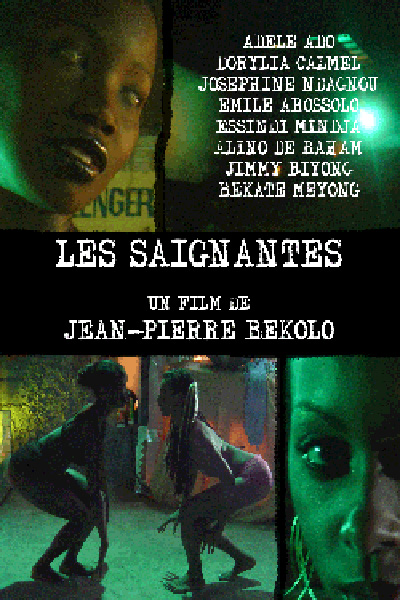 Saignantes (Les)Long-métrage – 2005Deux belles jeunes filles opèrent une sortie d'un enfer où plane la mort et la corruption dans un film de genre original africain qui flirte avec l'humour, l'horreur et l'action. "Les …Jean-Pierre Bekolo est lié(e) à ce film en tant que réalisateur/trice
Saignantes (Les)Long-métrage – 2005Deux belles jeunes filles opèrent une sortie d'un enfer où plane la mort et la corruption dans un film de genre original africain qui flirte avec l'humour, l'horreur et l'action. "Les …Jean-Pierre Bekolo est lié(e) à ce film en tant que réalisateur/trice -
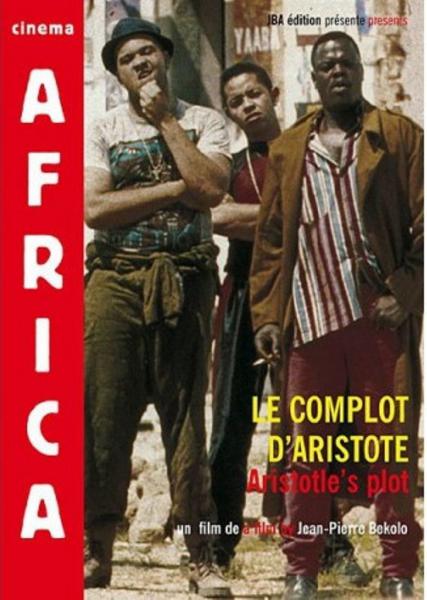 Complot d’Aristote (Le) | Aristotle’s PlotLong-métrage – 1996Dans une ville d’afrique du Sud où l’impact du cinéma hollywoodien a fait des adeptes, un groupe de voyous se soumet à des épreuves d’imitation de gestes fous, qu’ils ont pu voir dans les films d’action, en se faisant pa…Jean-Pierre Bekolo est lié(e) à ce film en tant que réalisateur/trice
Complot d’Aristote (Le) | Aristotle’s PlotLong-métrage – 1996Dans une ville d’afrique du Sud où l’impact du cinéma hollywoodien a fait des adeptes, un groupe de voyous se soumet à des épreuves d’imitation de gestes fous, qu’ils ont pu voir dans les films d’action, en se faisant pa…Jean-Pierre Bekolo est lié(e) à ce film en tant que réalisateur/trice -
 Grammaire de ma grand-mère (La)Court-métrage – 1996Un entretien avec le cinéaste sénégalais Djibril DIOP MambétyJean-Pierre Bekolo est lié(e) à ce film en tant que réalisateur/trice
Grammaire de ma grand-mère (La)Court-métrage – 1996Un entretien avec le cinéaste sénégalais Djibril DIOP MambétyJean-Pierre Bekolo est lié(e) à ce film en tant que réalisateur/trice -
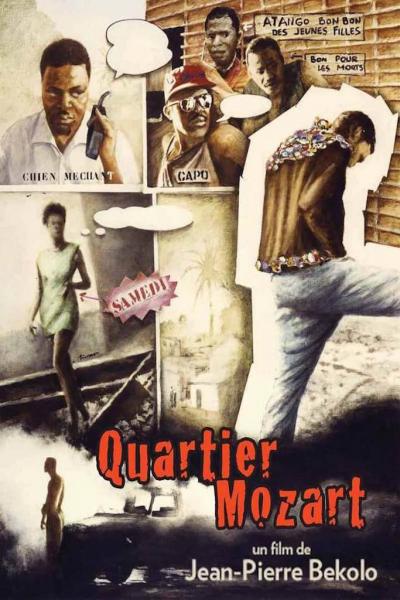 Quartier MozartLong-métrage – 1995Film camerounais de Jean-Pierre Bekolo, réalisé en 1995. Synopsis : Une fillette répondant au nom de Chef de Quartier est, au goût de la sorcière Mam Thecla, un peu trop curieuse pour son âge. Celle-ci, pour la punir…Jean-Pierre Bekolo est lié(e) à ce film en tant que réalisateur/trice
Quartier MozartLong-métrage – 1995Film camerounais de Jean-Pierre Bekolo, réalisé en 1995. Synopsis : Une fillette répondant au nom de Chef de Quartier est, au goût de la sorcière Mam Thecla, un peu trop curieuse pour son âge. Celle-ci, pour la punir…Jean-Pierre Bekolo est lié(e) à ce film en tant que réalisateur/trice -
 Un Blanc pauvre– 1988Un film écrit et réalisé par BEKOLO, Jean-PierreJean-Pierre Bekolo est lié(e) à ce film en tant que réalisateur/trice
Un Blanc pauvre– 1988Un film écrit et réalisé par BEKOLO, Jean-PierreJean-Pierre Bekolo est lié(e) à ce film en tant que réalisateur/trice
Partager :



